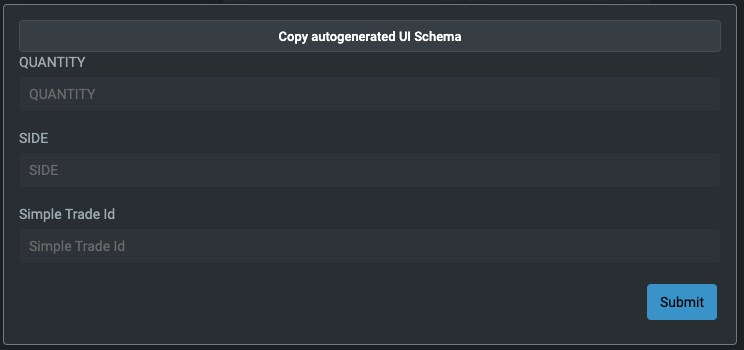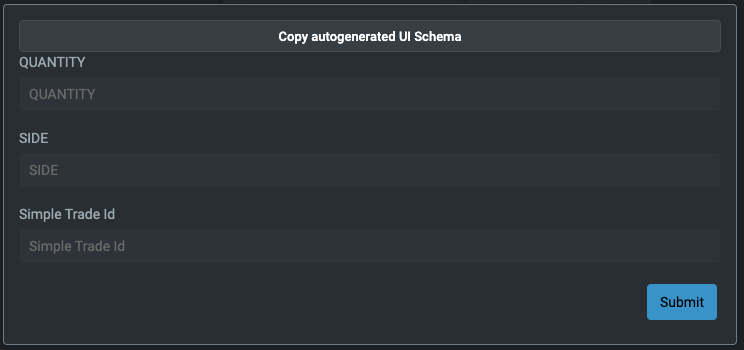Foundation Forms JSON schema
Foundation forms use a JSON Schema to define the underlying model of the form. This defines the objects and properties, as well as their types.
If the source of the data is a resource in a Data Server or Event Handler of your application, then you can use the JSON schema that is generated automatically by the Genesis Platform. Alternatively, you can define your own schema on the client.
This section covers aspects of the Data Server and DataBase sections. The examples provided are simple, but it is worth exploring these sections in more depth.
Server-side JSON schema
Here is an example of a simple table defined in an application's -tables-dictionary.kts file. It is a simple table with three fields:
smart-forms-examples-tables-dictionary.kts
tables {
table(name = "SIMPLE_TRADE", id = 10_000) {
field("SIMPLE_TRADE_ID", STRING).sequence("ST")
field("QUANTITY", DOUBLE)
field("SIDE", STRING)
primaryKey("SIMPLE_TRADE_ID")
}
...
}
The data for this table is provided by a query in the application's -dataserver.kts file. This is the data source:
smart-forms-examples-dataserver.kts
dataServer {
query("ALL_SIMPLE_TRADES", SIMPLE_TRADE)
...
}
The event that enables you to insert the data from the form into the database table is provided in the application's -eventhandler.kts file. This is the data source:
smart-forms-examples-eventhandler.kts
eventHandler {
eventHandler<SimpleTrade>("SIMPLE_TRADE_INSERT", transactional = true) {
onCommit { event ->
val details = event.details
entityDb.insert(details)
ack()
}
}
...
}
...
To insert the automatically-generated JSON schema for this resource in your template.ts file, use the code below:
forms-json-schema.template.ts
<foundation-form resourceName="EVENT_TRADE_INSERT">
</foundation-form>
Once you have done this, you will see a form that looks like this:

Client-side JSON schema
You can create your own JSON schema on the client side if you want to specify the exact content layout of the form.
Here is an example of a JSON schema defined on the client. It describes an object with two properties - QUANTITY and SIDE, similar to the one we described above.
You set the JSON schema on the foundation-form element using the jsonSchema attribute.
const sampleJsonSchema = {
type: 'object',
properties: {
QUANTITY: {
type: 'number',
description: 'kotlin.Double',
},
SIDE: {
type: 'number',
description: 'kotlin.String',
},
},
};
<foundation-form :jsonSchema="${() => sampleJsonSchema}">
</foundation-form>
The resulting form looks similar but it has no id field:

Full source code at JSON/UI Schema example.
License
Note: this project provides front-end dependencies and uses licensed components listed in the next section; thus, licenses for those components are required during development. Contact Genesis Global for more details.
Licensed components
Genesis low-code platform